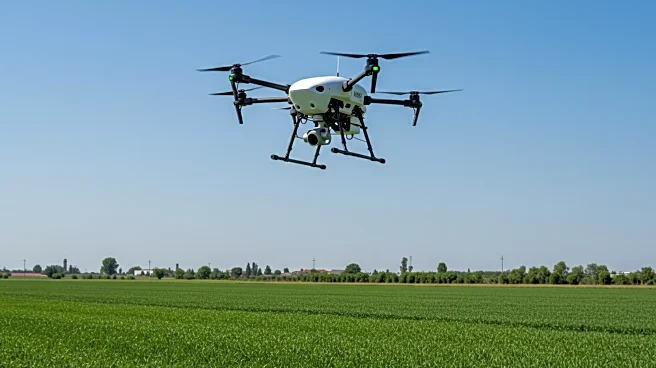What's Happening?
The agriculture sector is experiencing a technological transformation with the integration of artificial intelligence (AI) in precision agriculture. This shift is driven by the adoption of smart machinery and autonomous robotic systems, which utilize machine learning, deep learning, and predictive analytics to optimize crop production and resource utilization. Companies like Farmers Edge and Deere & Company have entered agreements to integrate data systems, allowing farmers to make informed decisions that enhance yields and profits. The AI-driven approach provides real-time insights into soil conditions, weather patterns, and crop health, enabling data-driven decision-making that improves productivity and supports sustainability. The market for AI in precision agriculture is projected to grow significantly, with a forecasted value increase from USD 776 million in 2024 to USD 4755 million by 2034.
Why It's Important?
The integration of AI in precision agriculture is crucial for addressing global food demand and optimizing resource utilization. By enhancing yield efficiency and minimizing resource consumption, AI technologies contribute to sustainable farming practices. This transformation supports long-term environmental objectives and reduces operational costs for farmers. The adoption of AI in agriculture also promotes scalable solutions to global challenges, such as food security and environmental sustainability. As AI technologies become more accessible, they offer significant potential for improving agricultural productivity and sustainability, benefiting farmers, agricultural cooperatives, and government bodies involved in food production.
What's Next?
The continued growth of AI in precision agriculture is expected to be supported by advances in Internet of Things (IoT) devices and sensor technologies, which improve real-time data collection and farm monitoring. Supportive government policies and financial incentives are likely to further accelerate market adoption. However, challenges such as high initial investment costs, data privacy concerns, and limited interoperability among AI platforms may need to be addressed to ensure widespread implementation. As AI technologies become more integrated into farming practices, stakeholders will need to focus on overcoming these barriers to fully realize the benefits of AI-driven agriculture.
Beyond the Headlines
The adoption of AI in precision agriculture raises important ethical and legal considerations, particularly regarding data privacy and cybersecurity. As extensive data collection becomes integral to AI systems, ensuring the protection of sensitive information will be crucial. Additionally, the shift towards AI-driven agriculture may require new regulatory frameworks to address data governance and technology standards. The long-term implications of AI integration in agriculture could lead to significant shifts in farming practices, potentially redefining the roles of farmers and agricultural consultants in the industry.









